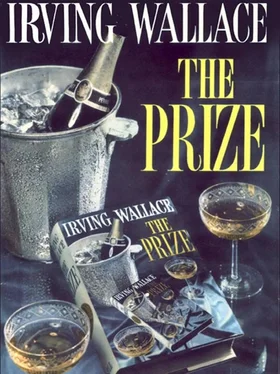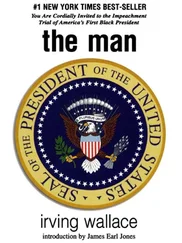‘Also, Joseph Goebbels, Heinrich Himmler, Julius Streicher, Reinhard Heydrich, Ilse Koch,’ said Stratman mildly.
Disconcerted, Krantz stared at Stratman. ‘Yes, of course, I agree with you, Herr Professor-but surely-wherever there is good, there is also evil. When the evil passes, the good remains. All Swedes understand this. As perpetual onlookers, we retain our objectivity. I am proud I was active for Germany during the war. Why not? In peace, it has offered us more than England or America.’
When Krantz finished, a heavy silence hung in the air surrounding members of the group. There was embarrassment, and it was shared by all. For a moment, Stratman considered disputing Krantz further, but the awareness of Emily at his elbow restrained him from speaking.
It was the young Prince who broke the stillness. ‘I believe it is understood that Sweden was not pro-German or pro-Allied. Sweden was pro-Sweden and pro-humanity, as witness our beloved Dag Hammarskjöld’s martyrdom in the cause of peace. Our instinct, like Switzerland’s, is for survival, our own and everyone else’s. Is that wrong? On the contrary, I think it is civilized and godly not to want to kill and to want to live. Perhaps if we were big and strong, we would have been forced to take sides. As it was, we remained history’s bystander. It is not a happy role, but there is much right in it.’
‘I was in the medical corps, attached to the Marines, in World War II,’ said Garrett. It was a complete non sequitur , at least to those who heard it, and several of the others appeared confused. But Garrett was, for himself, purposeful. ‘I saw combat at Iwo Jima,’ he went on. He was staring at Farelli. ‘Where were you in World War II, Dr. Farelli?’
There was a hush.
Farelli remained unperturbed. He regarded Garrett coolly. ‘I was not at Iwo Jima, but I was at Regina Coeli in Rome,’ he said. ‘I was an inmate of the prison. Not all Italians were Mussolini’s blackshirts, you see.’
Garrett felt the slap, and stood defeated, his mouth slack.
Farelli turned to Stratman. ‘However, I am sure Professor Stratman knows more of such misery than do I. As a Jew, he must have suffered more.’
Stratman felt Emily shiver beside him, and he replied in a low, serious tone. ‘I did not suffer, at least not physically. I spent the entire war in a laboratory, as a hostage. It was my sister-in-law who was in Ravensbruck and then Auschwitz.’
In his personal shame, Garrett wanted to say something, anything, to regain respect. He would show compassion. Without further thought, he blurted to Stratman, ‘Was she put to death in the crematorium?’
Stratman winced, and looked quickly at Emily. Her eyes had filled with tears, and she was frantic at her own emotional display. ‘I-I want a drink,’ she gasped, and then pivoted and hastened away.
Stratman watched her briefly, as she headed for the waiter, and then he faced the others and Garrett. ‘Yes, she was put to death in the gas plant. She was Emily’s mother. Emily spent the war in Ravensbruck. She is now my charge.’
The conversation had reached its dead end. Saralee pulled John Garrett out of the group, and they drifted off, and then the group disintegrated, and individuals of it attached themselves to other guests throughout the salon.
With a fixed fascination, made more intense by his inebriety, Andrew Craig had been staring for several minutes at the slender brunette with the provocative features, in the nearest gathering. Of all the young women in the large salon, she was the only one who captured his interest. While pretending to attend to the conversation of Ingrid Påhl, and a scholarly member of the Swedish Academy, and the Italian Minister, he was heedful only of the girl who stood so close beside Professor Stratman. He had known her before, he was positive, but where or when he could not remember. Yet, he told himself, had he known her before, he would not have forgotten. Suddenly, he was less positive that they had met.
Now he was startled to see her face writhe in agitation, and he watched her wheel away from the group, and remove herself from it. His eyes followed her as she went aimlessly about the room, and then he realized that she was heading for the liveried servant at a point midway between the girl and himself.
Acting on an impulse of the instant, moved by an unconscious necessity that he had no time to fathom, Craig unceremoniously excused himself from his gathering. Although his legs were not entirely obedient to his desire, and he weaved a little as he walked, he tried to reach the liveried servant at the same time that the girl reached him.
Emily Stratman had already confronted the tray, and taken the last champagne goblet from it, when Craig arrived.
‘Oh,’ he said, ‘well-I guess you beat me to it.’
‘I’m sorry,’ she said, hardly noticing him. ‘I’m sure there is more where this came from.’
Craig looked at the servant inquiringly. The man held up a finger, to tell him to wait a moment, and then hurried off.
Craig considered the girl, whose head was bent over her drink. ‘I’m sure I’ve met you somewhere,’ he said.
For the first time, she lifted her head to scrutinize him. ‘No, you haven’t,’ she said. Suddenly she wrinkled her nose, as if it bothered her. ‘It tickles,’ she said, and indicated her champagne. ‘Bubbles.’
‘You have to be French-or a skin diver-to avoid that.’
‘Mmm.’ She sipped the drink, avoiding his eyes.
‘Well, if we haven’t met-we might as well. I’m Andrew Craig. I’m-’
‘I know,’ she said. ‘You were pointed out to me when you came in. Congratulations.’
‘Thank you. Are you Professor Stratman’s daughter?’
‘I’m his niece.’
‘I see. He’s a bachelor, isn’t he?’
‘Very.’
‘And you take care of him?’
‘Probably the other way around.’ She hesitated, and then added, ‘My uncle is self-sufficient. ‘I’m not.’
He regarded her closely. She was taller than he had expected. The short black hair shone as it caught the lights. The curls along her cheeks enclosed her maiden’s face and gave it piquancy. The words ‘vestal virgin’ crossed his mind, yet the slanting eyes, Oriental emerald in colour, made ‘vestal virgin’ impossible. Her serenity enchanted him. Here was the picture of self-possession, yet she had just remarked that she was not self-sufficient.
‘I was watching you, a few minutes ago, in that group with your uncle,’ he said. ‘I was impressed by your poise-the gift of sangfroid , which the French so admire-until you suddenly seemed upset and broke away. Are you still upset?’
She considered him, for the first time, with wonder. ‘Yes, quite upset. Don’t let the façade deceive you. It took years to build, to have a place to hide.’ She paused, as if astonished with herself. ‘I don’t know why I’m telling you this. I must be drunk. This is my fourth champagne.’
‘I’m the one who must be drunk, to have even brought it up.’ He was compelled to go further. ‘I only asked about your being upset because I didn’t want to say the wrong thing to you. I can’t explain. It suddenly seemed important, that’s all.’
‘I don’t mind. It’s all right.’
‘You know my name. I don’t know yours.’
‘Emily Stratman. Birthplace Germany. Naturalized American citizen. Raised in New York City since fifteen-or was it sixteen? Now resident of Atlanta, Georgia. Have I left anything out?’
‘Yes. Marital status.’
‘Aggressively single.’
‘The result of a broken marriage?’
‘Is this how writers get their material? No marriage. Not past, present, or future.’
‘How can you know about the future?’
Читать дальше












